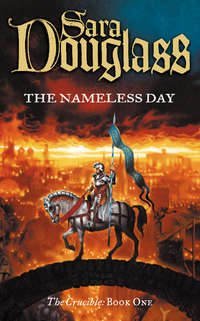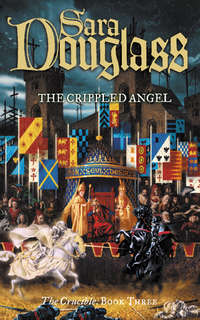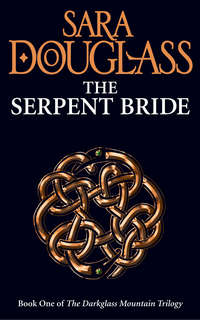
Полная версия
The Wounded Hawk
People glanced at them, and Bolingbroke managed to bring his laughter under control, although tears of mirth slipped down his cheeks and his face went stiff with the effort to keep his chortling muted. “I cannot believe you thought … I … and her Nay, nay, Tom, never fear that!”
Although Neville’s doubts regarding Margaret and Bolingbroke were finally and completely laid to rest, he now felt slighted on her behalf that Bolingbroke should prove so immune to her charms.
“Margaret is a very beautiful woman,” he said.
“Oh, aye, aye!” Bolingbroke continued to chortle, wiping away the tears from his face with a hand. “But … I … she …” He stopped, took a deep breath, and finally managed to gain complete control of himself. “Tom, I do beg your indulgence and forgiveness for any slight you felt I delivered to your wife. Margaret is truly an utterly desirable woman, but she is your wife, as she was once Raby’s woman, and I have too much love and respect for you, as I did for Raby, to even consider her a possible companion for bedsport. But tell me, what did she say to your other charge? That she was a demon.”
“She spoke strangely,” Neville said, “but with such a heavenly anger in her eyes that I was forced to believe every word she spoke.”
“And …?”
Again Neville focussed his gaze on Bolingbroke’s face. “She told me she was not a demon, but was also not a mere woman. She said she was of the angels.”
Any merriment still remaining in Bolingbroke’s eyes and face vanished completely. “And what else did she tell you?” he said softly.
Neville told Bolingbroke what had passed between them, and also detailed for Bolingbroke, as he had not done previously, the curse that Neville had heard from both Roman prostitute and demon. “Hal,” he finished, “she had such a look in her eyes that I was forced to believe her.”
“Such a look?”
“A look that I have seen only in one other being’s eyes—Saint Michael’s. She spoke truly when she said she was of the angels.”
Bolingbroke considered a long while before he spoke again. “Then Margaret is a remarkable woman indeed. Tom, even though she has told you she has been sent to provide the temptation to test you, can you truly resist her?”
“I must,” Neville said, “and I will. I shall regard her and treat her with the respect and pity she deserves, but I will not love her. She understands this.”
Bolingbroke reached out a hand and placed it on Neville’s shoulder, forcing Neville to look directly into his eyes.
“And when the pyre is lit, Tom, will you truly be able to throw her on it? Will you? Will you?”
Neville met Bolingbroke’s stare easily. “Margaret’s honesty has proved a blessing, for I can see that she is resigned to her fate and is prepared to sacrifice herself so that mankind will be spared Satan’s rule. Can I sacrifice her? Yes, I can, for both her sacrifice and my strength will surely see her live with the angels for eternity.”
“You couldn’t allow her to die the night she gave birth to Rosalind, though, could you?”
“That was different! She needed to live so that she might fill her proper—” her sacrificial “—role later!” And that was why I prayed so hard for her that night, Neville told himself. It was!
Bolingbroke drew back with shock and sorrow in his eyes. “Then God has a magnificent champion in you, Tom. No wonder the heavens rejoice in your very name.”
Neville nodded, taking Bolingbroke’s words as a compliment. “But the casket … the casket.” He shot a glance to the High Table where Richard was now leaning towards Isabeau de Bavière, engaging her in a conversation that had both their faces lit with amusement and their eyes dusky with lust.
Well, and it was surely no surprise that Isabeau de Bavière would tempt the boy-king into her bed. Or was it Richard who seduced Isabeau?
“We can do nothing until Richard summons us to his presence,” Bolingbroke said, barely restrained frustration and anger evident in his tone. “And at present the Demon-King is amusing himself by withholding that summons.”
Isabeau stretched out her arm and admired both its firmness and the brilliance of the gems in its armbands and finger rings. In the candlelight the gems glittered and sparkled, and their glow lent further sheen to her ivory skin.
Apart from her jewels, Isabeau de Bavière was utterly naked.
Women moved with silken whispers in the shadows about her, folding her clothes, pouring rosewater into a tub so that she might bathe away the sweat of both banquet and Richard. Isabeau’s mouth curled in silent memory: Richard had not even pretended decorous behaviour, escorting her behind the curtain that separated his bed from the High Table on the dais in the Painted Chamber and forcing her to its mattress even as diners were still exiting the hall.
Isabeau lowered her arm and sighed. Perhaps age was finally claiming its own, for she had found her bedsport with Richard a nauseating affair, and had risen and pulled down her skirts as soon as he’d rolled off her.
“I shall present my son with your kindest felicitations,” she had said, and then left him to return to her own chambers in Westminster’s palace.
“Madam?” one of the women said, sinking into a deep curtsey before her.
Isabeau sighed again and peered at the woman—girl, really. Who was she? Richard sent her new ladies every few days so that she might not form a close bond with any of them and perhaps subvert them to her own interests, and Isabeau found it difficult to recall names and faces. Ah yes, now she remembered …
“Mary, is it not?” she said. Her voice was deep and melodious and heavily accented with the dulcet cadences of her native country.
“Mary Bohun,” the girl said, finally looking up at Isabeau. She flushed, as if Isabeau’s nakedness disconcerted her.
“And I would hazard a guess,” Isabeau said, smiling, “that this Mary Bohun is a virgin.”
“But soon to be wed,” said another woman, now stepping from the shadows into the circle of candlelight that surrounded Isabeau.
“Who is this?” Isabeau said, not liking to be so interrupted.
Mary Bohun’s flush darkened, but she maintained her composure. “This is Lady Margaret Neville,” she said of Margaret, who had now sunk into her own curtsey before Isabeau. “She is one of my attendants, sent to serve with me this night, and also one of my closest confidantes.”
Isabeau studiously ignored Margaret, who had a beauty that was, disconcertingly, almost as great as her own.
“And so you are to be wedded and bedded, my dear,” Isabeau said to Mary. “And to which noble will fall the pleasure of inducting you into womanhood?”
“My Lord of Hereford,” Mary said. “Hal Bolingbroke.”
Isabeau’s face went still, then she affected disinterest with some considerable effort that did not escape Margaret’s attention.
“I have seen this Bolingbroke from afar,” Isabeau said, now reaching for a vial of cream on the chest beside her and fiddling with its stopper. “He is fair of face, and struts as if he has the virility of a bull. If I were you, my dear, I should eat well at your wedding feast, for I believe you shall need the energy for the night ahead.”
Isabeau put the vial of cream back on top of the chest with a loud crack and leaned close to Mary. “No doubt he’ll bruise you, and make you weep, but at least you shall have the blood-stained sheets in the morning to prove to your maids and, subsequently, to court gossip, that you are now truly the obedient wife and that you are well on your way to proving yourself yet another willing brood mare for the Plantagenet stallions.”
Isabeau sat back, a look of utter malice on her face as she stared down at the shocked Mary. “You are not a particularly desirable woman, Mary, and doubtless poor Bolingbroke shall have to call other faces to mind in order to rouse himself enough to accomplish your bedding. Never mind, Bolingbroke shall be happy enough the next morning, knowing that for his efforts he has won himself untold wealth with all the lands that fell under his control the instant he smeared your virgin blood across the sheets.”
Mary continued to stare at Isabeau’s face a moment longer, then she rose silently, her face ashen, and walked away.
“That was a cruel and unnecessary thing to say, madam,” Margaret said to Isabeau. “And spoken out of nothing but maliciousness!”
She, too, rose, but instead of immediately leaving Isabeau to her circle of candlelight and spiteful thoughts, leaned close and spoke so low that no one but Isabeau could hear.
“If you return to Charles’ camp, then tell Catherine that Bolingbroke takes Mary to wife. Tell Catherine!”
Margaret turned to go, but Isabeau’s hand whipped out and seized her sleeve with tight fingers. “And who are you to so issue me orders?”
“I am Catherine’s friend and soulmate,” Margaret said. “And you know, as well as I, that Catherine needs to know of Bolingbroke’s plans.”
Something in Margaret’s gaze, perhaps contempt, perhaps even pity, made Isabeau drop her hand.
“Send the girl Mary back to me,” she said, and sighed. “She is but a child, and I may have misled her. Perhaps it is not too late to undo the damage I have wrought.”
IX
Ember Saturday in September
In the first year of the reign of Richard II
(17th September 1379)
Ember Saturday in September was Feversham’s most important market day of the year. Men and women from all around the Kentish countryside made their way to the town, not only to market their wares, but their labour as well. The autumn agricultural markets were the best time for itinerant labourers to try to garner themselves a year-long work contract with one of the wealthier landlords or free farmers.
By Terce, a huge throng of people crowded the marketplace. Goods spilled over trestle tables and hastily erected stalls. Pigs, cows, horses and sheep jostled in small pens or tugged at their tie lines; dogs barked; geese, chickens and ducks squawked and honked; and the mass of people shouted, laughed, argued and prodded at the goods for sale.
A goodly proportion of the crowd, however, was edging away from the marketplace towards the church set at one boundary of the square.
There, a dusty, ragged priest with long, tousled hair was nailing a broadsheet to the church door. A sheaf of duplicate broadsheets ruffled in the light breeze at his feet.
As he nailed, the priest shouted out an abbreviated version of the contents of the broadsheet:
“Did God create both lords and bondsmen? Nay! He created all men equal! Why should you be the ones to live in draughty hovels and eat coarse bread while your lords live in castles and eat white bread, and rich clerics live in corrupt luxury? How is it they claim our lot is in the dirt and the freezing rain, while they wear fine furs and drink good Gascony wine? Truth is kept under a lock, my friends, and it is time to set it free!”
The priest had finished nailing the broadsheet to the door, and now picked up the pile of loose copies at his feet, turning to hand them out to the crowd jostling for position. He knew that few of them could read, but on a busy market day like this, the few that could would, within a short space of time, share the contents of the sheet with thousands of people.
“We all know how corrupt the Church is,” the priest continued to shout, “for have we not for generations witnessed the sins of the abbots and bishops? Has not good England laboured under the yoke of the Roman—”
“Or French!” someone in the crowd yelled, and there was general laughter.
“—Church for centuries? Why should we listen to fat bishops and foreign popes who say that unless we pay another penny, and yet another penny again, we shall not achieve salvation? Is salvation something to be purchased, my friends?”
The crowd mumbled, and then roared. “No! No!”
“Salvation is yours through the sacrifice of sweet Jesus Christ,” the priest yelled, his arms waving about emphatically now that he’d handed out all the broadsheets. “It is His gift! There is no need to pay the Church for salvation!”
The roar swelled again—the priest had touched a raw nerve.
“And what of your lords? Do they also not wallow in wealth while you grovel in the dirt? Do they not tax you until you cannot feed your children so that they can have their pretty tournaments and wars?”
There was a movement on the edge of the crowd, and the priest saw it. Soldiers, on horses.
“Who wears the face of Christ in this unhappy world of pain? Not the fat clerics, no! Nor the greedy lords. You wear the face of Christ, my friends, every one of you, through your hard work and poverty!”
The soldiers had pushed their horses very close, and the priest’s face began to gleam with sweat. Not through fear of being apprehended—he had always expected this—but through a desperation to preach to the crowd as much as he could before the soldiers reached him.
“The goods of both Church and lords belong to you, the face of Christ on earth! Not to bishops and dukes who care more for silks than for the thin cheeks of your children!”
People began to shout, some to voice their agreement with what the priest said, others to yell their anger at the now close soldiers.
“My name is John Ball,” the priest screamed, now directing his voice towards the soldiers, a few paces distant. “John Ball! I am not afraid that the corrupt lords and bishops should know it! My name is John Ball and I am the voice of the people, and of Christ, who weeps for the people!”
The was a huge surge of sound, and the soldiers pounced, seizing John Ball by the back of his robe and hauling him kicking and screaming atop one of their horses. One of the soldiers rode his horse close to the church door, and tore down the broadsheet.
“Let him go! Let him go!” the crowd shouted, and the twenty soldiers had to lash about with their swords and push their horses forward to fight their way free.
“It is the Archbishop of Canterbury’s men!” someone in the crowd shouted, and the throng screamed and pushed and pummelled. “Christ damn the Archbishop of Canterbury! Christ damn the Archbishop of Canterbury!”
John Ball, now held firmly across the saddle of one of the men, nevertheless managed to raise his head and yell one last defiant message to the crowd. “When Adam delved, and Eve span—who then was the gentleman?”
And then the soldiers were free, pushing their horses into a hard canter, and there was left only the swelling, murmuring crowd, passing the broadsheets to those who could read out loud.
“What did you know of this?” Lancaster said, throwing the broadsheet down on the table before Bolingbroke.
“My lord,” Bolingbroke said, then hesitated, picking the broadsheet up as gingerly as if it were gunpowder.
Lancaster’s furious eyes swung towards Neville, who stood just behind Bolingbroke’s shoulder. Neither of the two younger men were sitting. They had been summoned into Lancaster’s presence just a few minutes before.
“My lord,” Bolingbroke said again. “I had known that Master Wycliffe and several of his men were travelling through Kent—”
“And you had not informed me? Sweet Jesu, Hal, why not? And why not stop them? Do you think I would be pleased to have men known to be of my household engaged in such seditious activities? Ah! Wycliffe has gone too far this time.”
Neville knew he was going to earn Lancaster’s anger for not informing him personally of Wycliffe’s visit to Halstow Hall, but all he felt for the moment was relief. Lancaster had finally seen the danger in nurturing the demon Wycliffe, and now, perhaps, would go to the lengths necessary to stop him.
“I only found out myself a few days ago,” Bolingbroke said. “I had thought to gather greater intelligence before informing you.”
“My lord,” Neville said. “This is my error, not my Lord of Hereford’s. The day before Salisbury came to Halstow Hall to summon me back to London, I received a visit from Wycliffe, accompanied by Wat Tyler—”
Lancaster sprang out of his chair. “What?”
“—and two Lollard priests, John Ball and Jack Trueman. My lord, I do beg your forgiveness, but they told me they travelled at your pleasure towards Canterbury. I had not thought to comment further on it to you.”
Lancaster muttered an obscenity, moving to stare out a window before turning back to the other two men. “And now Wycliffe and Tyler and the other two are roaming about the south-east, tacking sedition to every wall they can find? No, do not answer that, I do not want to hear the affirmative!
“Well,” he sighed, and rubbed at his beard, thinking, “at least Ball is incarcerated in my Lord of Canterbury’s prison and is, for the moment, the lesser problem … unless he decides to implicate my entire household in treason.”
“My lord,” Bolingbroke said, stepping forward, “he surely will not do that!
“Does anyone know where the other three are?” Neville said.
“Wycliffe, yes,” Lancaster said. “Tyler and Trueman, no. Good Master Wycliffe is in Rochester, where he has been some few days. I have sent men—forty trusted men-at-arms—to fetch him away.”
“You will not bring him back here, my lord!” Neville said.
Lancaster glanced at him. “No, I won’t have him within shouting distance of London, Tom. He goes to my manor of Lutterworth in Leicestershire where he can contemplate the sins of the world in its walled herb garden. As for Tyler—what has gotten into the man?—and Trueman … they have vanished into the labouring population of Kent. Word is out for their apprehension, but I know Wat better than most men, and if he doesn’t want to be found …”
“And Richard?” Bolingbroke asked softly.
Lancaster actually looked relieved. “The three of us in the room are the only ones who know of Wycliffe’s involvement, and that of Wat Tyler. Those two are the only ones publicly associated with my household. The broadsheets, thank God, are unsigned, and do not mention Wycliffe’s name, or the name of any of my house. As far as John Ball is concerned, my Lord of Canterbury has agreed to hold him without public comment for the moment.”
Neville relaxed a little. Simon Sudbury, the Archbishop of Canterbury, was heavily indebted to Lancaster for supporting Sudbury’s election to the archbishopric some years ago.
“So we must hope Tyler and Trueman cause no disturbance that might come to the king’s ear,” Bolingbroke said.
“Aye,” Lancaster said. “That we must.”
John Ball huddled a little deeper into his thin robe, closed his eyes against his dreary, dirty cell and prayed to Jesus Christ for strength.
Then footsteps sounded outside the door, and Ball’s eyes flew open.
A key rattled in the lock, and the door opened.
One of the guards stood there, carrying a bundle of warm clothing and a bag of food.
“From a friend,” the guard said, tossing both clothing and the bag of food to Ball. “A good man, a former sergeant-of-arms of mine. He said to tell you to be strong and of good cheer, for when the time comes, yours shall be the voice to strike the match.”
Ball nodded, then, as the door closed and locked, once again closed his eyes, this time to thank Christ for the love of a man known as Wat Tyler.
X
Vigil of the Feast of St Michael
In the first year of the reign of Richard II
(Wednesday 28th September 1379)
The Black Prince’s victory at Poitiers had crippled French pride and determination. Not only had the cursed English ground French pride into the mud, but King John had been captured, and the flower of French nobility had been lost to either the arrows of English longbowmen or the ransom demands of English nobles.
And then, out of all of this calamity, God in His boundless goodness sent hope to the virtuous French in the sweet form of the miraculous virgin, Joan, and judgement to the vile English in the simultaneous deaths of both Edward III and his warrior son, the Black Prince.
At the darkest day, when the French were stricken with defeat, God had opened the door for a Gallic triumph.
Now, Isabeau de Bavière was determined to slam it shut in His face.
“And so, my darling boy,” Isabeau said, enjoying every moment, “I did so sign away your heritage and your throne. It was but truth, and I was bound to speak it some day. Here,” and she held out the copy of the Treaty of Westminster to Charles, who stared at it pallid-faced and tormented.
Isabeau stood there with her arm extended just long enough to make the moment intensely uncomfortable, then she let the treaty flutter to the floor.
“Well,” she said, “no matter.”
She stepped past her son and smiled maliciously at the gathering standing behind Charles in the hall of la Roche-Guyon. “Why the surprise over all your faces? Have you not called me the harlot and whore behind my back for decades? Well, now I confess it.” Isabeau threw apart her arms in a dramatic gesture. “I am so the whore and harlot! ‘Twas indeed the Master of Hawks—oh, how I wish I could remember his name!—who put Charles inside me with his peasantish vigour and odious onion breath. And … see!”
Isabeau clasped her hands together before her face, and turned back to Charles as if enthralled by the very sight of him. “Has my son not inherited his father’s penchant for the stables? I swear before God he’d be far more comfortable atop a dung heap than standing in this grand hall. And … see!”
Now Isabeau whipped about and stared at the girl, Joan, standing thick and dark in men’s clothing to one side.
“Has he not also inherited his father’s taste for peasant company? His companion betrays him, for my son prefers the stench of peasants to the sweet spice of nobility.”
Charles’ face was now so white that he looked as if he might faint. In contrast to bloodless cheeks, his pale blue eyes were brilliant, brimming with tears of mortification.
His mother, his hateful mother, had never so publicly, nor so successfully, humiliated him. All those whispered rumours now being flung into his face with a devastating, ruthless candour.
He was the son of a peasant—how could anyone now gainsay it?
His eyes jerked to the treaty lying on the floor. All France—and England!—must be laughing at him. He trembled, and started to wring his hands. Every argument Joan had used to sustain his courage was lying on the floor along with that treaty … lying on the floor with his whore-dam’s laughter washing over it!
“Madam,” Joan said, glancing at Charles as she stepped forth. Her face was serene, but her demeanour was that of the stern judge. “It is you, not your noble son, who produces the stench in this hall. You lie for profit, and to further your own ambitions. Before God, you know it was Louis who fathered Charles on you. Admit it, or damn your soul.”
Isabeau’s haughty expression froze on her face. Her eyes widened, her mouth pinched, and her hands clenched at her sides.
She tried to stare Joan down, but the girl’s serene, confident gaze did not waver, and eventually it was Isabeau who looked away.
She saw that Charles was gazing at Joan with an expression almost of fear.
Useless, hopeless man, Isabeau thought. He wants nothing less than to believe me, not Joan. To believe Joan would mean he might actually have to do something about regaining his realm. No doubt he thought it would never go this far.
“Look at him,” said Isabeau softly. “How can anyone here believe he was sired by a noble father? He is the very image of wretchedness. How can you want him as your king?”
Having regained some of her courage, Isabeau looked back to Joan, who she saw was still wrapped in her damned self-righteous serenity.
“I swear to God, Joan,” Isabeau said, “that he must give you good satisfaction in your bedsport, for I cannot imagine why else you champion the cause of such a dullard.”






